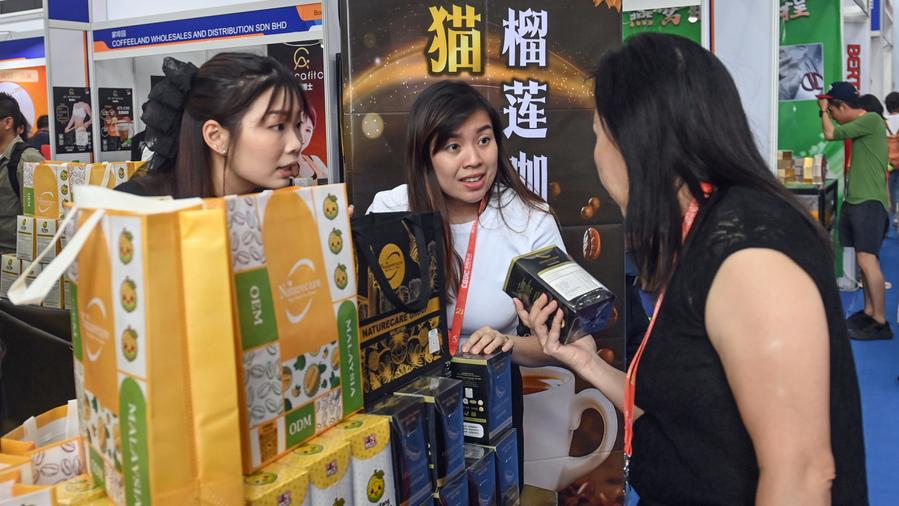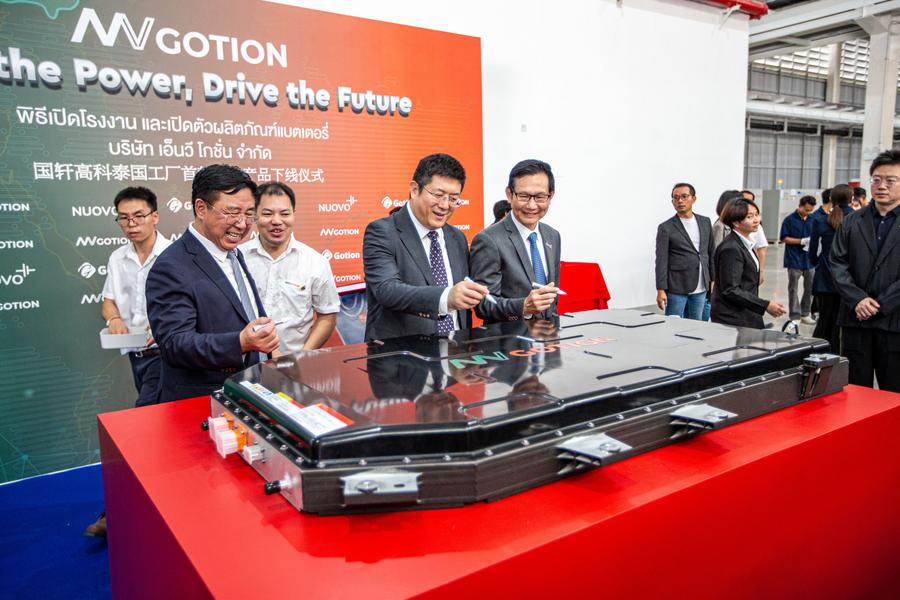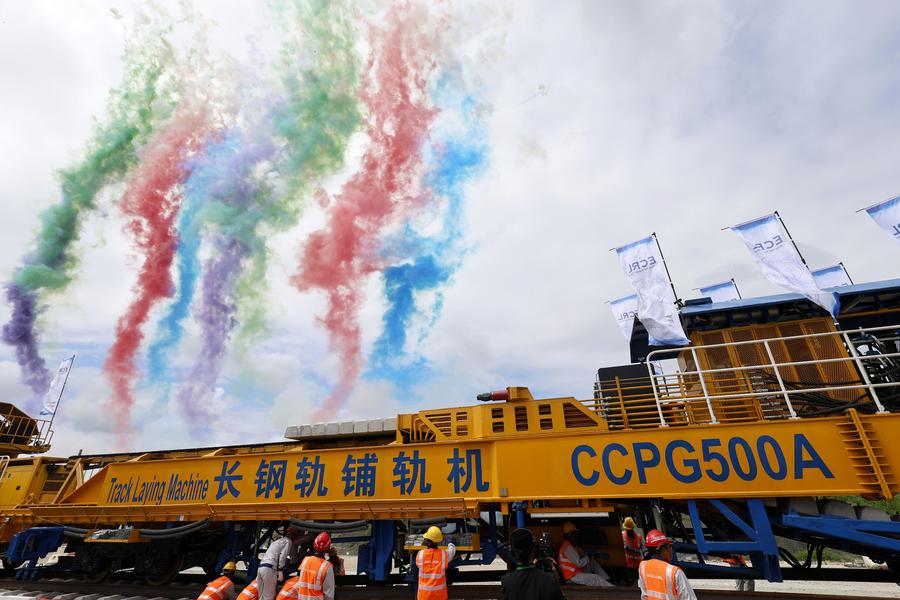* China's commitment to expanding high-standard opening-up and the rapid industry upgrading in ASEAN nations has fostered stronger economic ties between the two sides. Together, these efforts drive regional high-quality development while sharing China's development opportunities with ASEAN.
* Huang Aimin, chairman of the first council of the Guangxi Cross-border E-Commerce Association, said cross-border e-commerce has the potential to be a critical platform for promoting in-depth economic and trade cooperation between China and ASEAN.
* Leading Chinese renewable energy firms are working closely with ASEAN enterprises and investing in new facilities to produce innovative, locally adapted products, thus actively contributing to ASEAN's green transition.
NANNING, China, Sept. 25 (Xinhua) -- Visitors arriving at this year's China-ASEAN Expo (CAEXPO) will encounter an intriguing blend of fresh innovations and familiar attractions. A new section spotlights emerging industries such as artificial intelligence and lithium batteries, while longstanding crowd favorites, like durian, longan, and rice, continue to draw attention.
This evolving landscape mirrors the deepening partnership between China and ASEAN. China's commitment to expanding high-standard opening-up and the rapid industry upgrading in ASEAN nations has fostered stronger economic ties between the two sides. Together, these efforts drive regional high-quality development while sharing China's development opportunities with ASEAN.
EMPOWERING ASEAN SMES
Stepping into the Thai Pavilion at CAEXPO, visitors are greeted by the distinct aroma of durian mingling with the herbal scent of Zam-buk, a popular Thai remedy for insect bites. A booth showcasing the collaboration between TOPTHAI and China's e-commerce leader, JD.com, drew significant interest.

A visitor learns about a durian-flavored coffee at the booth of Malaysia during the 21st China-ASEAN Expo at Nanning International Convention and Exhibition Center in Nanning, south China's Guangxi Zhuang Autonomous Region, Sept. 24, 2024. (Xinhua/Zhang Ailin)
TOPTHAI store on leading e-commerce platforms is an initiative launched by the Thai Department of International Trade Promotion this year. It aims to help Thai small and medium-sized enterprises (SMEs) expose their products to more overseas markets, among which the Chinese market is a crucial destination, said Dr. Nisachol Thaithong, a Thai trader and researcher in China-Thailand cross-border e-commerce.
For SMEs and small-scale farmers in ASEAN countries, participating in e-commerce with China has transformed their businesses.
"It (CAEXPO) is moving forward dynamically in terms of the more areas of cooperation, in terms of engaging wider stakeholders," said Kao Kim Hourn, secretary-general of ASEAN, in an interview on the sideline of CAEXPO and China-ASEAN Business and Investment Summit (CABIS). "Now they are involved in the Micro-, Small, and Medium-sized Enterprises (MSMEs), for example. MSMEs are really the backbone of the economy on both sides. We have to get them involved, in addition to the big cooperations. I think this is the right direction that we are taking."
Frequent exchanges between China and Malaysia leadership have set a positive tone for SMEs, said Ravenna Chen, the CEO of TusStar Malaysia, an innovation and entrepreneurship platform.
Huang Aimin, chairman of the first council of the Guangxi Cross-border E-Commerce Association, said cross-border e-commerce has the potential to be a critical platform for promoting in-depth economic and trade cooperation between China and ASEAN.
Collaborating with China has sped up modernization in Laos. For instance, working with China to digitize businesses and develop e-commerce skills has been advantageous for both businesses and young individuals in Laos, according to Thanongsinh Kanlaya, Vice President of the Lao National Chamber of Commerce and Industry.
UPGRADING AGRIBUSINESS
At a durian orchard in Thailand's Chanthaburi province, Kosai, the 32-year-old owner and a Chinese social media influencer, was promoting durians to Chinese netizens through the live streaming e-commerce platform Tmall.
Kosai is proud that his orchard is a smart orchard jointly built by the Commercial Association for Sustainability of Agriculture in Thailand and the Foreign Economic Cooperation Center of China's Ministry of Agriculture and Rural Affairs.
The Internet of Things installed by the Chinese side in Kosai's orchard, which includes meteorological, water level, and soil moisture monitoring, could provide data support for the scientific cultivation of durian and the improvement of fruit quality.

Klos Hirunburana (R), chairman of the Commercial Association for Sustainability of Agriculture (CASA) in Thailand, promotes durians to Chinese netizens through the livestreaming on e-commerce platform Tmall at a durian orchard in Thailand's Chanthaburi province, May 24, 2024. (Xinhua/Sun Weitong)
Modern farming is a sector with a promising future for cooperation between Malaysia and China, said Low Kian Chuan, president of the Associated Chinese Chambers of Commerce and Industry of Malaysia.
Despite the difference in size and population between Brunei and China, CAEXPO and CABIS have offered a platform for Brunei enterprises to conduct win-win cooperation with Chinese peers, said National Chamber of Commerce and Industry Brunei Darussalam President Haji Abdul Saman bin Haji Ahmad.
Platforms like CAEXPO and CABIS incentivize Brunei SMEs to grow "more resilient and more proactive" by exposing their products and services to the Chinese market, said Saman, adding that he sees particularly promising opportunities for Brunei's halal food.
GREEN TRANSITION
Leading Chinese renewable energy firms are working closely with ASEAN enterprises and investing in new facilities to produce innovative, locally adapted products, thus actively contributing to ASEAN's green transition.
In July, BYD opened an electric vehicle plant in Thailand, the automaker's first Southeast Asian factory, a fast-growing regional EV market. The same month Eve Energy announced a plan to build a new factory in Kulim, Kedah state, Malaysia to meet the fast-growing demand for energy storage and consumer batteries in the South East Asia region.

Guests inscribe signatures on the first battery product of NV Gotion jointly established by Gotion High-tech and Nuovo Plus at Siam Eastern Industrial Park in Rayong, Thailand, Dec. 7, 2023. (Xinhua/Wang Teng)
In August, Gotion High-tech announced that a battery assembly plant project in Malaysia is under negotiation, in addition to its assembly plants in Indonesia and Thailand. The battery manufacturer's Vietnam factory is expected to begin production in October this year.
Malaysia's East Coast Rail Link under the Belt and Road Initiative is expected to drive economic development in the east coast areas and promote more balanced development among regions within the countries, said Anthony Loke Siew Fook, the minister of transport of Malaysia.

This photo shows the launching site of the East Coast Rail Link project, a mega rail project in Malaysia being built by the China Communications Construction Company (CCCC), in Kuantan, Malaysia on Dec. 11, 2023. (Xinhua/Chong Voon Chung)
As outlined in the National Automotive Policy 2020 and National Energy Transition Roadmap, Malaysia is developing its renewable energy battery sector and welcomes leading battery manufacturers to invest in it, said Loke.
Malaysia encourages Chinese companies to form partnerships with local companies to further promote the use of electric and hybrid vehicles in Malaysia, not only in terms of car manufacturing but also in the entire ecosystem, from charging networks to battery manufacturing, said Zalina Zainol, deputy chief executive officer of investment development at Malaysian Investment Development Authority.
Malaysia highly encourages such cooperation to further create high-skilled jobs in engineering, research and development, and advanced manufacturing, thereby boosting economic growth here, Zainol added. (Video reporters: Liang Shun, Huang Kaiying, Yu Jiaming, Dong Shuo, Liu Siyuan, Zhang Yichi, Qin Guanghua; Video editors: Zhu Cong, Zhang Yuhong.)




 A single purchase
A single purchase









